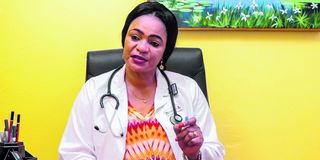Prenatal sickle cell screening key for early detection

What you need to know:
- Sickle cell disease (SCD) is one of the inherited diseases characterised by a modification in the shape of the red blood cells (RBCs)
To a woman, accomplishing the tasks of pregnancy for nine months is the foundation for becoming a mother. Regardless of the challenges a mother has gone through during pregnancy, the result of giving birth to a child should always be a joy.
Becoming a mother (or a father) is a moment to celebrate. The parents feel much joy, experience great happiness, and rejoice with family members. Every parent wishes that happiness would become an everlasting one. However, at times, some children immediately die after they are born, while others suffer from various diseases like sickle cell disease. That moment becomes a hectic and stressful moment for the parents as they feel helpless for their child.
Sickle cell disease (SCD) is one of the inherited diseases characterised by a modification in the shape of the red blood cells (RBCs). The RBCs contain materials called hemoglobin that carry oxygen to all the body parts. The healthy RBCs are round in shape, but for people with SCD, they change into a crescent or half-moon-shaped structure.
Those cells can block small blood vessels and affect blood flow. Consequently, this shortens the survival of red blood cells and subsequently causes anaemia known as sickle cell anaemia.
A person with sickle cell disease has a poor oxygen supply in their blood, causing those sickle cells to die early. Consequently, it causes acute pain and severe bacterial infections, among other challenges. Such a patient requires regular blood transfusions to maintain an adequate supply of haemoglobin to sustain life.
According to the World Health Organization (WHO), sickle cell disease can be successfully cured by a bone marrow transplant, which is an expensive procedure and not readily available in most settings.
Thanks to Benjamin Mkapa Hospital, Dodoma, Tanzania, because on May 10, 2023, it launched a bone marrow transplant for sickle cell anemia. This is the first centre in Tanzania and East and Central Africa to transplant bone marrow. That is a remarkable achievement in the health sector, as it brings hope to children with sickle cell disease and their parents.
According to the WHO, “the most cost-effective strategy for reducing the burden of haemoglobin disorders is to complement disease management with prevention programmes”. Couples at risk of having affected children can know themselves through blood testing.
Thus, screening is vital to a couple before marriage or before pregnancy so that they can have an opportunity to discuss their family health status. WHO elaborates that “subsequent genetic counseling informs trait carriers of risks that the condition may be, passed on along from parents to their children, the treatment needed if affected by a hemoglobin disorder, and the possible options for the couple.
Currently, for the majority of citizens in the country and probably in Africa, prenatal screening before marriage or pregnancy is for HIV/AIDS only; hence, there is a need to raise awareness about sickle cell disease as well.
Last Thursday, President Dr. Samia Suluhu Hassan visited Benjamin Mkapa Hospital, where she also met children cured by bone marrow transplanting. Health minister Ummy Mwalimu, clarified that 20 children will be transplanted this year. Thanks to President Samia for funding the treatments. According to Ummy Mwalimu, out of 100 children with sickle cell diseases, 70 to 90 children die before they turn age of 5 years.
WHO indicates that sickle cell predominates in Africa, and each year, over 300,000 babies with severe forms of these diseases are born worldwide. Approximately, 5% of the global population are healthy carriers of a gene for sickle-cell disease, and in some regions, that number reaches 25 percent.
Let’s therefore raise awareness (prenatal screening campaign) from the individual, family, community to the national level about the need for prenatal screening for couples expecting to get married to prevent sickle cell risks.
Dr. Saumu Jumanne is a Lecturer at Dar es Salaam University College of Education (DUCE).





